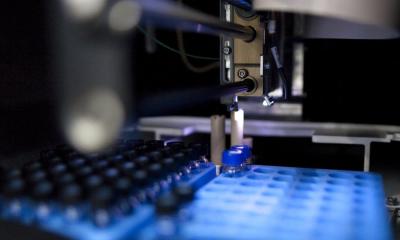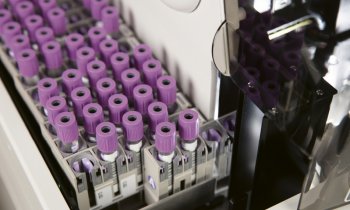
Image source: EHU; photo: Egoi Markaida
News • Potential diagnostic medium
Saliva analysis could reveal risk of cancer, heart disease or Parkinson’s
The study led by a team at the University of the Basque Country (Euskal Herriko Unibertsitatea, EHU) has identified hundreds of molecular markers in the oral cavity that can reflect pathological processes in other parts of the body.
A research team led by the EHU has identified hundreds of molecular markers in saliva that could reveal the risk of a person developing major diseases such as cancer, cardiovascular diseases, diabetes and neurodegenerative diseases. Their results lay the foundation for the development of a powerful, non-invasive tool for early diagnosis and precision medicine.
The results have been published in the journal npj Genomic Medicine.
This work opens the door to developing saliva-based testing that could in the future be used for the early detection of diseases or for monitoring treatments, without the need to extract blood or perform other invasive procedures
Alba Hernangómez-Laderas
“Saliva is one of the most accessible biological fluids but it is still underutilised in clinical practice”, said José Ramón Bilbao, Professor of Medical Genetics at the EHU and one of the lead authors of the study. “Our results show that molecular markers present in saliva can reflect systemic pathological processes beyond the oral cavity.”
It is widely known that saliva samples are used to perform genetic tests to determine, for example, paternity, but the potential of saliva-based clinical analysis goes far beyond this, as shown in this research conducted by the EHU.
The research team analysed saliva samples from more than 350 people and catalogued the common variations in DNA, known as genetic polymorphisms, or SNPs (single nucleotide polymorphisms), that could influence genome function in saliva. Specifically, they found that these polymorphisms act as a switch that activates or deactivates the function of the genes they affect. Comparing the data from their study with the results of previous large international genetic studies on the risk of developing chronic diseases, they observed that many of the same polymorphisms that were detected in the saliva are associated with a higher risk of developing common diseases such as prostate cancer, coronary disease, Parkinson’s and Type 2 diabetes.
Furthermore, using advanced statistical tools, the research group demonstrated that these markers can explain a significant proportion of the genetic heritability of various diseases; in some cases with greater precision than traditional blood indicators.
Although these findings need to be validated in larger cohorts for each of the diseases, they represent a significant advance in identifying non-invasive disease biomarkers. As explained by Alba Hernangómez-Laderas, researcher at the Department of Genetics, Physical Antropology and Physiology, and another lead author of the study, “this work opens the door to developing saliva-based testing that could in the future be used for the early detection of diseases or for monitoring treatments, without the need to extract blood or perform other invasive procedures.”
Another contribution from this study is the creation of the largest public database of genetic data derived from saliva samples, which can be consulted via an open-access platform. “It is expected that the open-access nature of the database will encourage new research studies and innovations in different biomedical disciplines”, commented the researchers.
Source: University of the Basque Country
01.07.2025











